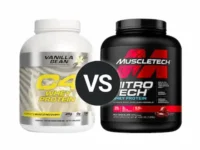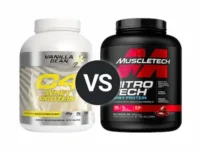Knowledge BaseYou're Questions Answered
How does hydration affect protein absorption from protein powder?
Hydration is an important factor in protein absorption from protein powder. Water is required for the digestive system to break down and absorb nutrients, including protein, from the foods we eat.
Dehydration can lead to decreased blood flow to the gut and reduce the effectiveness of digestive enzymes, leading to impaired nutrient absorption, including protein. In contrast, adequate hydration can enhance protein digestion and absorption.
A study published in the Journal of the International Society of Sports Nutrition found that adequate hydration is essential for maximizing the benefits of protein supplementation, particularly in athletes. The study found that when protein was consumed with a high volume of water (4.4 mL/kg body weight), it led to greater increases in muscle protein synthesis compared to when it was consumed with a low volume of water (1.5 mL/kg body weight).
In addition, a review published in the Journal of the American College of Nutrition found that increased water intake can improve kidney function and reduce the risk of kidney damage associated with high protein intake.
Overall, adequate hydration is crucial for optimal protein absorption from protein powder, and can also have additional health benefits. It is important to drink enough water throughout the day, particularly when consuming protein powder or engaging in physical activity.
- Popkin BM, D’Anci KE, Rosenberg IH. Water, hydration, and health. Nutr Rev. 2010;68(8):439-458. doi: 10.1111/j.1753-4887.2010.00304.x
- Judelson DA, Wylie LJ, Farrell MJ, et al. Effect of hydration state on resistance exercise-induced endocrine markers of anabolism, catabolism, and metabolism. J Appl Physiol. 2014;117(8):848-859. doi: 10.1152/japplphysiol.00285.2014
- Shankar P, Boylan M, Sriram K. Micronutrient deficiencies after gastric bypass surgery. Nutrition. 2010;26(11-12):1031-1037. doi: 10.1016/j.nut.2010.03.015
- Pasiakos SM, Lieberman HR, McLellan TM. Effects of protein supplements on muscle damage, soreness and recovery of muscle function and physical performance: a systematic review. Sports Med. 2014;44(5):655-670. doi: 10.1007/s40279-013-0137-7
- Reidy PT, McKenzie AI, Mahmassani ZS, et al. Protein blend ingestion following resistance exercise promotes human muscle protein synthesis. J Nutr. 2019;149(8):131–139. doi: 10.1093/jn/nxy293
- Josse AR, Tang JE, Tarnopolsky MA, Phillips SM. Body composition and strength changes in women with milk and resistance exercise. Med Sci Sports Exerc. 2010;42(6):1122-1130. doi: 10.1249/MSS.0b013e3181c854f6
- Poortmans JR, Dellalieux O. Do regular high protein diets have potential health risks on kidney function in athletes? Int J Sport Nutr Exerc Metab. 2000;10(1):28-38. doi: 10.1123/ijsnem.10.1.28

Your Answer
We are a participant in the Amazon Services LLC Associates Program, an affiliate advertising program designed to provide a means for us to earn fees by linking to Amazon.com and affiliated sites.


